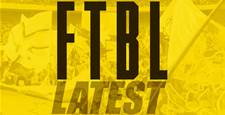Rarely do we cross paths with former stars of the sporting stage who boast as much enthusiasm as us for bringing outsiders “in” as Brad Fittler
Rarely do we cross paths with former stars of the sporting stage who boast as much enthusiasm as us for bringing outsiders “in” as Brad Fittler
As the title of the magazine you’re holding suggests, we’re forever chasing the “inside” story on this latest sports drama, or that next big thing. Very rarely, however, do we cross paths with former stars of the sporting stage who boast as much enthusiasm as us for bringing outsiders “in” as Brad Fittler. The veteran of over 30 Tests for Australia, who set many a “youngest-ever” record when he side-stepped his way onto the league arena as a schoolboy in the late-90s, loves introducing people to rugby league. The former Panther and Roosters legend has even written a couple of books which do just that: The Fittler Files – My Season From The Sidelines, the latest edition of which is on the shelves now.
With the commencement of the 2013 rugby league season only a matter of weeks away, kicking off with trial matches in regional areas, the World Club Challenge and the now-annual All Stars match, we thought it would be a grand idea to chase the inside story on the very exciting life and times of this Channel Nine commentator, the man they call “Freddy”.
You’ve produced a few Fittler Files now, as well as a self-titled book a few years back. What do you enjoy most about working in the publishing industry?
I actually found that first book taxing, digging up your own stuff – so much information about yourself, constantly thinking about memories, going over things, re-reading it. But I really enjoy putting together The Fittler Files. If anything, the work helps keep my commentary on the ball. It ensures I watch every game, watch it closely, look for things, make sure I have my camera with me ...
What discoveries about the game you love so much have you made during the compilation of The Fittler Files books?
That the game has definitely changed since I played; obviously given the public and media scrutiny and also the professionalism, as in time spent at training. How the game is played these days has definitely changed, too. Apart from that, it’s the same people playing it, the same things are happening around the game ...
So it’s still “footballers” playing the game?
Absolutely, no doubt. And good ones. They’re better than they have ever been. They’re fitter, stronger, faster, pass longer, they stay focussed longer. They’re definitely better.
This latest edition is full of your photos ‒ how did your passion for photography start?
Towards the end of my playing career I realised I didn’t have a record of anything. I seemed to enjoy taking photos, so I started taking my camera along on a few tours and snapped photos and memories. You try and get a bit arty every now and then. It’s funny, you have these boofhead footballers and you’re trying to take nice photos with backdrops and that sort of stuff. You think about the things you read in books about lighting, etc. I’ve found I’ve finished with some really nice shots. Another thing I’ve found is that everyone likes their photo taken. It’s never a bad thing when someone asks you to get your photo. Most people are obliging.
On the back cover of your book, Andrew Johns says you “see the world differently” – what does he mean by that?
People seem to think I have a different gauge on life ... I don’t know. Next question is: And what is that? I’m pretty free-spirited, really, just try and take most things as they come.
I stood with my Dad on a muddy hill in the rain at the Magpies’ home ground, Orana Park, watching you play a blinder in your first-grade debut in ’89 as a high-school student. The opposition must have licked its lips at this new prey ...
The fact we were winning that day helped me. The footy team I played in no doubt helped, too. It was really physically tough, blokes like Peter Kelly, Chris Mortimer, Mark Geyer, Greg Alexander, Royce Simmons. A lot of real campaigners. No one was going to put it over them. When you’re really young and you gravitate towards a group like that, you develop this confidence. I had it from the first moment I touched the ball in first grade. The first couple of things I did, they didn’t lay a hand on me, I went straight through and set up a couple of tries. From that moment, I thought: “This is my place, this is where I want to be.” The week before I played reserve grade against Manly, who were the premiers, actually. Penrith were coming second last, and we beat ‘em. I scored a couple of tries. That was my first game in grade. It was a fairytale start.
As a youngster you posed for a photo underneath the “Penrith Is It” sign in the players’ race at Penrith Park. Was that your belief as a kid – that Penrith was the world and you were on top of it?
That was my world. I didn’t desire for anything. I didn’t want to be in Sydney, I didn’t want to talk to anyone from other clubs ... I was in Penrith. I was submerged in Penrith. I was extremely happy. I had a good group of friends. It was a great place to grow up. Every now and then we’d hit the road, go up to Newcastle for a weekend, or in the pre-season go for a drink somewhere else, but outside that ... Ryan Girdler arriving at the club in ’93, I think it was, changed me a little bit because he had such a beach background. He’d take me out surfin’. So, once I actually started going to the beach, I realised I liked it.
I’ve heard and read stories about you being ill before big matches – how did you eventually overcome that problem?
Yeah, I’d be dry-retching, stuff like that. Whether I was unsettled or nervous, whether it was my diet at the time, eating too close to the game ... I used to enjoy playing on an empty stomach. That was the thing, every now and then, whacking the finger down the throat just to dislodge something! I always tried to be as empty as I could. It’s funny, because when I started out as a kid, I played at 100kg minimum. By the end I was about a stone lighter, about 95-96kg. That light feeling, I found, was a real trigger for me. It made me feel fast.
Who did you have more passion playing for – the Panthers or Easts?
First and foremost, I love footy. There was a lot of distraction in our game around the time I moved to the Roosters. Once I came to Sydney, I knew I had a responsibility ... I had to do what I had to do ... Sydney’s a wonderful area. There’s a lot of things I don‘t like about the eastern suburbs, but I just don’t involve myself in them. I involve myself in things I absolutely love. It’s just so beautiful – the beach, the climate ... It’s just the greatest place in the world. I found a real motivation to work hard, to fight hard for the Sydney Roosters because I love the place so much. I won’t ever move out of here. I just don’t know where I’d move to ... Sometimes you have to look for motivation, which wasn’t hard here. The team-mates down here were really good fellas. I’d followed the Penrith coach at the time, Gus Gould, here. So between the team-mates and the area, I found a real passion for the Roosters. There was plenty of motivation to want to achieve here. It was a little different at Penrith, because it was who I was. I grew up there, I thought that was where I was going to spend my whole life. I was always a Penrith boy.
You enjoyed plenty of Kangaroo Tours to the United Kingdom. Any standout memories there?
On my first-ever tour, they put me in a room with Chris Johns, who was a six-schooner-a-day man – I was like a 100-or-nothin’ man. So Johns would take his six and then go to bed and I would stay out for the rest of the night. That pretty much destroyed my first trip ... The second trip I roomed with Dave Furner, a lot more sensible; we got on famously ...I went to England in ‘90, ’92, ‘94,’95, but 2000 and 2001 were awesome. I was a lot more in control, had a different role in the team. We had a great side. That was one of the most talented squads I’ve played in. Lockyer had come in, you’ve got Joey, Gorden, Wendell and Lote on the wing, Fletch, I think Ricko was there. A hugely talented side. And good fun. They were all good blokes. It’s a great spot ... temporarily.
Anything stick in your mind of the craziness of your rugby league journey?
Alcohol played a big part. I just wish I was able to take control of alcohol a lot earlier. I don’t regret it because at the time I’m sure I was enjoying myself. I’m talking about from day one, really. Even from when I was pre-18. I wish alcohol didn’t play as big a part in everyone’s life, really. I remember smiling a lot ...
You finished with a bandaged head after your Sydney Roosters downed the Warriors in the ‘02 grand final. Have you ever thrown yourself into a match like that night?
Physically I was in a really good spot. I’d gone into the grand final two years before carrying injuries. We’d gone close then, which I learnt so much from. I thought we were going to win in 2002. I knew it was going to take an effort, but I thought we were going to win. That was a good day.
Was it surreal playing against the team you grew up with in the 2003 grand final?
They were a good side. They were young, big. I remember in the last six weeks of the season, I got injured playing out at Penrith Park. I popped my shoulder. I was carrying a different feeling about it all to ’02. I knew we were good enough to win. We were favourites, but it was a pretty even call, given the health of both sides. Then, with the pouring rain that night ... I remember the two forward packs were so tough, just bashing each other. That was the most brutal game I’ve ever been involved in. Both sides just ... because of the rain ... pretty impressive, really.
Related Articles
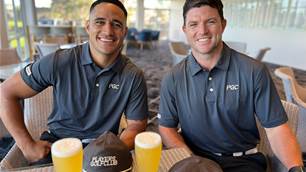
19 Holes With ... Chad Townsend and Val Holmes
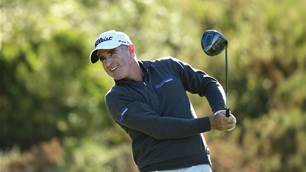
Video interview: Drinks With ... Matt Millar




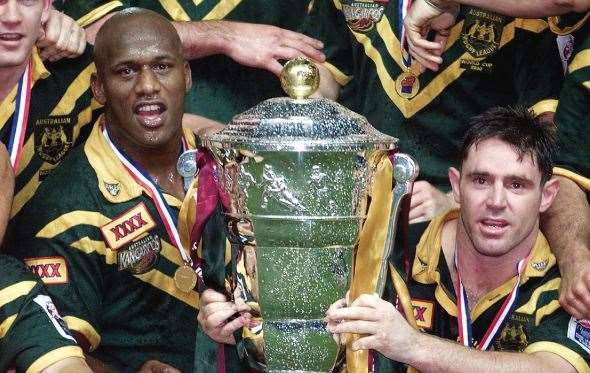
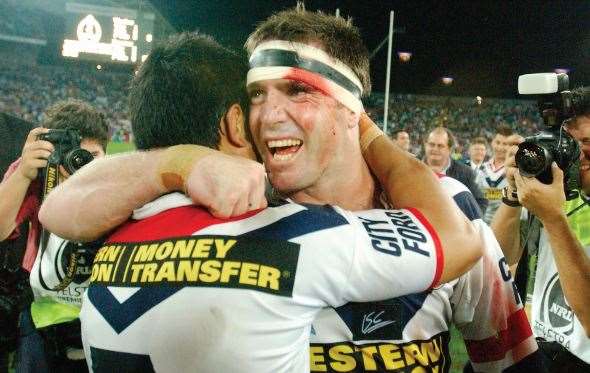

.png&h=115&w=225&c=1&s=1)


